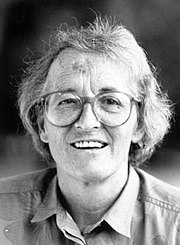Elisabeth Kubler-Ross
| Dr. Elisabeth Kübler-Ross | |
|---|---|

Elisabeth Kübler-Ross
|
|
| Born |
July 8, 1926 Zürich, Switzerland |
| Died | August 24, 2004 (aged 78) Scottsdale, Arizona, United States |
| Fields | Psychiatry |
| Institutions | University of Chicago |
| Known for | Kübler-Ross model |
| Influenced | Caroline Myss, Vern Barnet, Bruce Greyson, Sogyal Rinpoche |
| Spouse | Manny Ross (1958–1979) |
| Children |
Ken Ross Barbara Ross |
Elisabeth Kübler-Ross (July 8, 1926 – August 24, 2004) was a Swiss-American psychiatrist, a pioneer in near-death studies and the author of the groundbreaking book On Death and Dying (1969), where she first discussed her theory of the five stages of grief.
She was a 2007 inductee into the American National Women's Hall of Fame. She was the recipient of twenty honorary degrees and by July 1982 had taught, in her estimation, 125,000 students in death and dying courses in colleges, seminaries, medical schools, hospitals, and social-work institutions. In 1970, she delivered The Ingersoll Lectures on Human Immortality at Harvard University, on the theme, On Death and Dying.
Elisabeth Kübler was born on July 8, 1926 in Zürich, Switzerland, one of triplets. Elisabeth was born fifteen minutes before her identical sister, Erika. Minutes later came her sister, Eva. Her family were Protestant Christians. Her father did not want her to study medicine, but she persisted. Eventually her father took pride in her career. In an interview she stated:
In Switzerland I was educated in line with the basic premise: work work work. You are only a valuable human being if you work. This is utterly wrong. Half working, half dancing - that is the right mixture. I myself have danced and played too little.
During World War II she became involved in refugee relief work in Zürich and later visited Majdanek death camp. She graduated from the University of Zürich medical school in 1957.
In 1958 she married a fellow medical student from America, Emanuel ("Manny") Ross, and moved to the United States. Becoming pregnant disqualified her from a residency in pediatrics, so she took one in psychiatry. After suffering two miscarriages, she had a son, Kenneth, and a daughter, Barbara, in the early 1960s. Her husband requested a divorce in 1979.
...
Wikipedia
